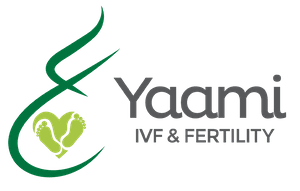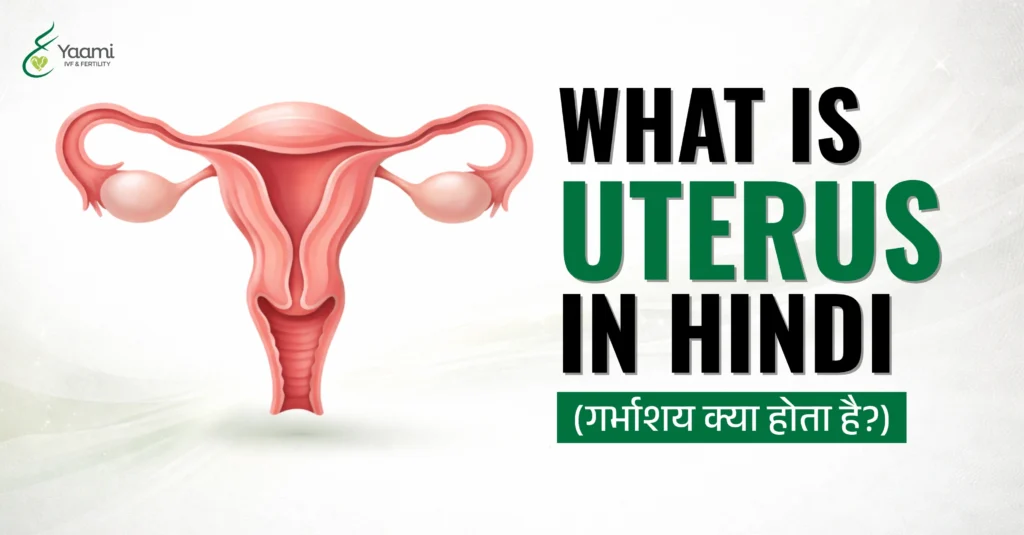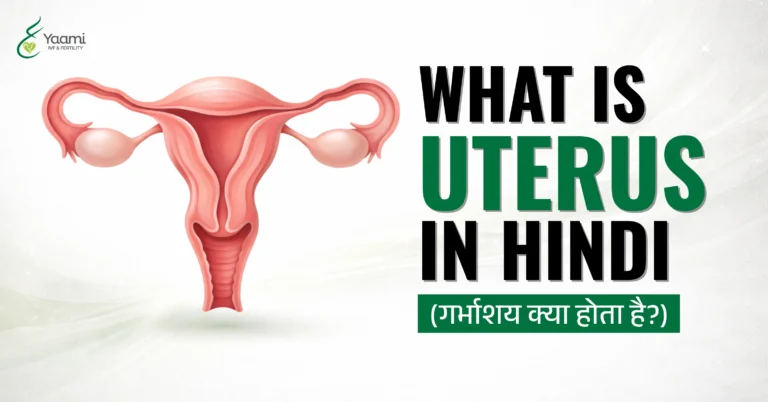If you are planning a normal pregnancy or IVF pregnancy, you should know the importance of endometrial thickness during pregnancy.
If you want to know more, this blog will help you with all the details about endometrial thickness during pregnancy.
Our IVF expert, Dr Sankalp at Yaami Fertility in Indore have curated a complete guide for endometrium size for pregnancy, how to increase endometrium thickness, and thin endometrium causes and symptoms.
A Complete Guide to Endometrial Thickness During Pregnancy
The endometrium is the uterus lining, consisting of thick tissues that thicken and grow during the menstrual cycle, preparing for the pregnancy phase. It is a pear-shaped organ that houses a foetus.
When a fertilized egg is implanted into the uterus wall during normal or IVF pregnancy, the endometrium lining stays in place and thickens. If no egg is implanted, it is shed during a menstrual period
Endometrial thickness is essential for successfully implanting the egg in the uterus lining. Ideal endometrial thickness during pregnancy typically ranges from 18mm to 20mm.
A thin endometrium may not be able to support pregnancy, whereas an endometrium with ideal thickness, between 8mm to 14mm, can increase the chances of implantation and pregnancy. A thick endometrium, more than the required thickness, can also cause implantation issues, likely leading to a miscarriage.
For all those who are facing troubles with a natural pregnancy, despite trying out for a year, our IVF specialists will offer the best infertility treatment to you.
For the endometrial thickness during pregnancy, let’s scroll down for essential facts!
Normal Endometrial Thickness in Pregnancy
According to the Radiological Society of North America (RSNA), the endometrial lining is thinnest during menstruation, usually between 2mm to 4mm thick. This thickness increases to 5mm to 7mm when the bleeding stops, at the end of the menstrual cycle or before ovulation.
As the menstrual cycle progresses and moves toward the ovulation phase, the thickness increases to 11mm. Around after 14 days of the menstrual cycle or during the secretory phase, endometorial thickness reaches its thickets to 15mm or 16mm.
Endometrial Thickness During Early Pregnancy
The endometrium thickens during the early pregnancy, and during the end of the first trimester, it thickens around 18mm to 20mm.
Endometrial Thickness During Late Pregnancy
The endometrium does not increase its thickness during late or progressing pregnancy phases. However, it becomes more vascularized (full of blood vessels), which provides nutrients to the growing fetus.
Endometrium thickness during late pregnancy typically ranges around 22mm to 24mm.
Factors Affecting Endometrial Thickness During Pregnancy
A. Hormonal Factors
Hormonal factors play an essential role in the endometrial thickness. Progesterone and estrogen are the two essential hormones that affect the growth and development of the endometrium.
1. Estrogen Levels and Endometrial Growth
Estrogen is responsible for the growth stimulation of the endometrial lining by promoting the proliferation of the endometrial cells.
Estrogen levels peak during the follicular phases of the menstrual cycle (the first half of the cycle). As estrogen levels rise, the endometrium thickness also increases.
When estrogen levels are too low, the endometrium will not grow and can lead to hypoplasia (characterized by thin endometrium).
2. Progesterone Levels and Endometrial Development
Progesterone is responsible for preparing the endometrium for the implantation of the fertilized egg. It stimulates the secretion of nutrients by endometrial cells. Progesterone levels also rise during the second half of the menstrual cycle.
As progesterone levels rise, the endometrium becomes more secretory and vascularised.
If the progesterone levels are too low, it will affect the endometrium development, leading to a condition called dysplasia (characterised by abnormal endometrial lining).
B. Medical Conditions
1. Polycystic Ovary Syndrome (PCOS)
Polycystic Ovary Syndrome (PCOS) is a hormonal disorder that affects women. Women with PCOS often have high levels of androgens, which are male hormones.
High levels of androgens can interfere with ovulation and cause the endometrium to become thick.
Can You Get Pregnant with PCOS? Yes, Here’s How
2. Endometriosis
Endometriosis is when tissue that normally lines the uterus grows outside the uterus. This tissue can grow on the ovaries, fallopian tubes, bladder, bowel, or other organs. Endometrial tissue outside the uterus is not shed during menstruation, which can cause the tissue to grow thick and build up.
3. Uterine Fibroids
Uterine fibroids are non-cancerous tumours that can grow in the uterus. Fibroids can sometimes cause the endometrium to become thin.
4. Asherman’s Syndrome
Asherman’s Syndrome is when scar tissue forms in the uterus. Scar tissue can cause the endometrium to become thin or irregular.
C. Medications and Treatments
1. Hormonal Medications
Estrogen and progesterone supplements can help to thicken the endometrium.
2. Intrauterine Insemination (IUI)
Intrauterine Insemination (IUI) is a procedure in which sperm are placed directly into the uterus. This can help increase pregnancy chances in women with a thin endometrium.
3. In Vitro Fertilization (IVF)
In Vitro Fertilization (IVF) is a procedure in which eggs are fertilized by sperm in a laboratory dish. The fertilized eggs are then transferred to the uterus. IVF can be a successful treatment for women with a thin endometrium.
Evaluating Endometrial Thickness During Pregnancy
Ultrasound Evaluation
Ultrasound is considered a non-invasive procedure that uses sound waves to create an image of the inside body parts and is generally used to evaluate the ovaries and uterus.
1. Transvaginal Ultrasound
Performed under the assistance of a trained healthcare professional, it is done using a wand-shaped probe that is inserted into the vagina and then provides a clear image of the ovaries and uterus.
(The generated images from transvaginal ultrasound are then used to measure the endometrial thickness.)
Other Diagnostic Methods
1. Hysteroscopy
Hysteroscopy allows healthcare professionals or IVF specialists to examine the cervix or the uterus. The doctor inserts a thin tube with an attached camera into the cervix or vagina, which transmits the images to a monitor.
2. Endometrial Biopsy
In this procedure, a small piece of tissue it taken from the uterus lining and sent to a laboratory for analysis. Endometrial biopsy is performed during a pelvic exam, where the doctor uses a thin tube with a small brush and inserts it into the uterus. The brush then collects the piece of tissue from the uterus lining.
Abnormal Endometrial Thickness during Pregnancy
1. Thin Endometrium
A thin endometrium (below 7mm) indicates signs of underlying health conditions, including infertility (difficulty in pregnancy), endometrial cancer (that starts in the endometrium lining), endometrial hyperplasia (when the endometrium lining becomes too thick), polyps (small growth that develops into uterus lining) and atrophic vaginitis (a condition that makes vagina lining thin and dry).
Causes of Thin Endometrium
A. The endometrium lining thins with age.
B. Low estrogen and progesterone levels also lead to thin endometrium.
C. PCOS and other medical conditions can also be the causes of thin endometrium.
2. Impact on Implantation and Pregnancy
The endometrium comprises two layers- the functional layer, which sheds during menstruation, and the basal layer, which provides a foundation for the next cycle.
A thin endometrium makes it difficult for an embryo to implant and develops into a pregnancy. The endometrium supports the embryo, and the thin lining is insufficient for the desired support.
3. Treatment Options for Thin Endometrium
A. Hormone Therapy
Hormone therapy is used to increase the body’s progesterone and estrogen levels, which helps thicken the endometrium.
B. IUI (Intra-Uterine Insemination)
In the IUI procedure, the sperm is placed directly into the uterus, which helps with increased chances of pregnancy for a woman diagnosed with thin endometrium.
C. In-Vitro Fertilisation (IVF) –
In the IVF procedure, the sperm and eggs are fertilised outside the body in the laboratory dish. The fertilised egg is then transferred to the uterus, which can help with successful implantation for women diagnosed with thin endometrium.
4. Thick Endometrium
Thick endometrium is when the endometrial lining is thicker than the expected range. Too thick endometrium can cause menstrual bleeding, infertility, and endometorial cancer.
Causes of Thick Endometrium
A. Estrogen and progesterone imbalance can thicken the endometrial lining.
B. PCOS, characterised by high levels of androgen (male hormones) can lead to thick endometrium.
C. Anovulation, where ovaries do not release eggs for a month, also can lead to thick endometrium.
Potential Complications of a Thick Endometrium
A thick endometrium can cause a range of problems, including –
A. Heavy menstrual bleeding further leads to anaemia and other health issues.
B. Infertility, a thick lining, makes it difficult for the embryo to implant.
Management of a Thick Endometrium
Management of the thick endometrium will depend on the underlying cause of the issue.
A. In the case of hormonal imbalance, hormone therapy can help.
B. In anovulation, ovulation induction therapy can be helpful.
C. In endometrial hyperplasia, surgery is prescribed to remove the excess tissue.
Improving Endometrial Thickness for Pregnancy
Several things can be done to improve endometrial lining, which also increases the successful chances of pregnancy. These include –
A. Opting for a healthy diet rich in plenty of fruits, whole grains and vegetables.
B. Opting for a regular exercise schedule improves the blood flow to the uterus.
C. Getting enough sleep, which helps with hormone production, is essential for fertility.
D. Managing stress through meditation, yoga and other nature.
E. Several supplements like Vitamin E, CoQ1O and L-arginine can also help.
F. Avoid alcohol consumption and smoking.
Medical Interventions
Apart from the above-mentioned general pointers, a list of medical interventions can help improve endometrial lining during pregnancy.
A. Endometrial Scratching is a minor procedure that creates microscopic abrasions to help the uterus accept an embryo.
B. Endometrial Receptivity Analysis – a test determining the best time to transfer an embryo to the uterus during the IVF cycle.
C. Growth Hormone Therapy, which helps increase the production of growth hormone.
D. Platelet-Rich Plasma (PRP) Therapy, which uses platelets for healing.
Conclusion:
After analyzing all the details and factors related to endometrial thickness during pregnancy, it can be concluded that endometrial thickness helps support egg implantation to the uterus lining, which increases the chances of implantation and pregnancy.
There is nothing to be worried about for all those facing issues in getting pregnant or diagnosed with thick or thin endometrium.
Thick or thin endometrium can easily be treated with various treatment and medication options. For individuals or couples facing infertility issues due to endometrial lining, IVF (In-Vitro Fertilization), with the help of experts, can be your best choice.
Connect with IVF Specialists in Indore at Yamini Fertility to know more.

Dr. Sankalp Singh (MBBS, MS – Obstetrics & Gynecology, FIRM, FRM – Germany) is a highly respected Reproductive Medicine and IVF specialist with over 20 years of clinical experience. He is the founder and chief consultant at Yaami Fertility & IVF Center, Indore, where he provides advanced fertility solutions including IUI, IVF, ICSI, and fertility preservation. Trained internationally, Dr. Singh combines global expertise with a compassionate approach to guide couples on their journey to parenthood. He is also deeply committed to academic teaching, clinical research, and spreading awareness about reproductive health and fertility treatments.











